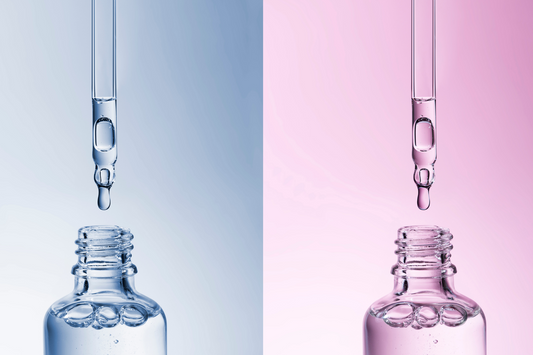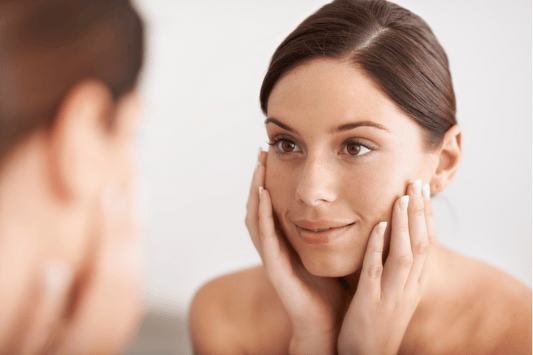Feelings of sadness, loss, and even grief often accompany hair loss, but it may be surprising to you to learn that these feelings sometimes trigger the actual loss of hair. Both hair loss and depression are far more common than you think. Between 50 and 60% of men and women are affected by hair loss. It’s estimated that one in five adults suffer from depression in the U.S.
At Revela, we want to normalize the conversation about how our mental well being is directly connected to our physical well being, and in the process understand what options you have to bridge the gap between depression and hair loss.
Let’s talk about what depression is, the root causes of hair loss, and what you can do to get relief. We’ll also talk about a revolutionary ingredient that helps support your roots and help your hair thrive.
What Is Depression?
Anyone who has experienced depression can tell you; it’s more than just occasional sadness. Many other symptoms are hallmarks of depression, but an underlying feeling of despair is a common denominator. Depression is a medical condition that requires a diagnosis. If you think you have depression, you can look for symptoms to discuss with your healthcare provider.
What Are the Symptoms of Depression?
Depression can manifest in different ways in different people, and not everyone will have the same symptoms. Common symptoms can include:
- Feelings of intense sadness, despair, and hopelessness
- Suicidal thoughts or ideation
- Lack of interest in pastimes or hobbies that were once loved
- Isolation or lack of engagement in social activities
- Missed time from work; inability to maintain a job or attendance
- Feelings of anxiousness or stress
- Lethargy, tiredness, desire to sleep more than normal
- Difficulty with concentration and decision making
While it can be normal for everyone to experience these symptoms from time to time, symptoms of depression usually last for at least two weeks but can last months or years at a time.
What Are Common Causes of Depression?
Depression is thought to be caused by a change in brain chemistry that causes a person to feel and act differently. Although it is often referred to as a chemical imbalance, which means the person is making too little or too much of a particular chemical like serotonin, new research says it’s more complex.
A person’s genetics may predispose them to depression, as can faulty mood regulation in their brain, life events, and stressful situations. Even if a person has never experienced depression, a stressful or traumatic event can cause them to experience it, even for a time.
One life event that could potentially lead to depression is hair loss.
Defining Hair Loss
Everyone loses hair. In fact, it’s common to lose between 50 to 100 hairs per day. Hair loss as a medical condition is defined by the loss of hair without new hairs growing in their place.
The Hair Growth Cycle
The three phases of hair growth are governed by a structure located at the bottom of the hair follicle called the dermal papilla. This structure supports the hair matrix cells and tells them when to enter each stage of hair growth.
- Anagen. The anagen phase of the hair cycle is the growth phase. During this phase, the hair matrix cells multiply and form a chain. These cells harden and attach to each other to form a strand of hair that pushes up through the hair follicle.
- Catagen. The catagen phase is the transitional phase of hair growth. During this phase, the hair cells stop multiplying, and the root of the hair detaches from the dermal papilla, disconnecting itself from the blood supply.
- Telogen. The telogen phase is the resting phase of hair growth. During the telogen phase, the hair rests in the hair follicle until a new hair (in the anagen phase) pushes it out through the pore located at the top of the hair follicle.
At any given time, most of your hair is in the anagen phase at any given time. However, if you are experiencing hair loss, there could be a problem with one of the phases of hair growth.
Does Depression Cause Hair Loss?
Studies show that some symptoms of depression, like excess stress, can lead to hair loss. Because stress can lead to hormonal changes, it’s possible for depression to precipitate telogen effluvium.
Additionally, stress can lead to obsessive-compulsive behaviors that affect hair growth and loss, like trichotillomania. This disorder causes a person to pull out their hair obsessively.
Depression can also cause nutritional deficiencies. These deficiencies can lead to hair loss if they aren’t corrected, and thereby experience hair that feels dry, brittle, and often breaks. This doesn’t necessarily imply hair loss, but it can lead one to believe they are losing more hair than normal.
Does Hair Loss Cause Depression?
Research tells us that the loss of hair has a negative psychological impact. Hair loss is associated with a perceived failure to adhere to societal norms and can make a person feel less than or isolated.
People who experience hair loss all over the body (including the eyebrows and eyelashes) may experience depressive symptoms more often than those who only experience hair loss on the scalp.
Hair loss can be especially difficult for women. Hair loss is common in women, but it’s less common for women to discuss it or search for solutions. Many hair loss solutions available aren’t appropriate for women, especially if they are pregnant or nursing.
What Can I Do About Hair Loss?
If you’re experiencing depression, talk to someone like your doctor. It’s important to make sure you have a support system when you experience periods of sadness and stress. If you think your sadness and thinning hair could be related, you should know you’ve got options.
Supercharge Your Roots
You've probably considered your options if you’re dealing with thinning hair. Unfortunately, the solutions available have remained the same for almost forty years. What’s worse, they usually come with some pretty undesirable side effects, especially for women.
Revela exists to change the way women approach thinning hair. With our revolutionary AI-discovered ingredient, ProCelinyl™, you’ve got a new way of achieving the hair of your dreams.
How It Works
Revela’s Hair Revival Serum works in two ways: first, by targeting dormant follicles to stimulate and awaken your roots, and second by dosing your hair with a combination of proven, research-backed ingredients that help keep your scalp and hair follicles nourished.
By targeting the follicles, Hair Revival tackles thinning hair where it starts. Our serum is free of hormones, parabens, toxins, and phthalates and is 100% cruelty-free.
Trying something new is brave, and it’s even harder if you’re in an unclear headspace. With Revela, you can take care of your hair and get the stress-free hair you love.





